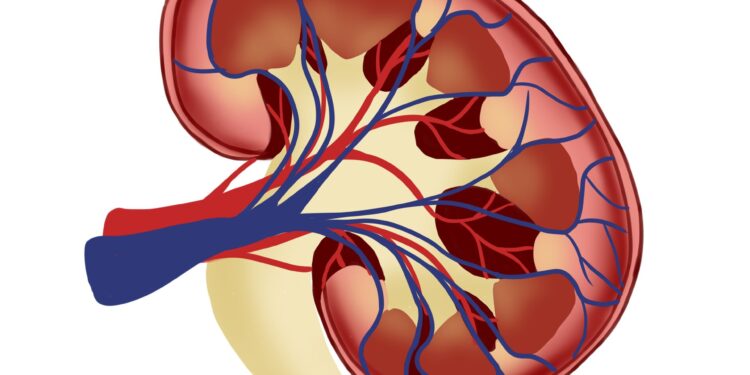Credit: Pixabay/CC0 Public domain
In a clinical trial of patients with chronic kidney disease, an investigational drug significantly reduced albuminuria (albumin in the urine, a sign of kidney damage) in 50% of participants. When the investigational drug was combined with a standard-of-care drug, 70% of participants reportedly experienced a significant reduction in albuminuria.
The results were published in The Lancet. The paper’s lead author is Dr. Katherine Tuttle, clinical professor of nephrology at the University of Washington School of Medicine and executive director of research at Providence Inland Northwest Health in Spokane.
The drug candidate, BI 690517, is designed to inhibit the body’s production of aldosterone, a hormone that balances sodium and potassium levels to help regulate blood pressure. However, too much aldosterone accelerates the progression of kidney disease.
The challenge, she explained, is that two classes of standard treatments for kidney disease, angiotensin-converting enzyme (ACE) inhibitors and angiotensin receptor blockers (ARBs), tend to increase aldosterone levels in the long term. Aldosterone inhibitors themselves, while reducing organ inflammation and preventing kidney disease from progressing to kidney failure, may allow blood potassium to reach dangerous levels, a condition called hyperkalemia, among others. other adverse side effects.
These considerations shaped the trial design.
“Participants were required to take an ACE or ARB at the maximum tolerated dose for at least four weeks before they could participate in the study,” Tuttle said. “And we added another drug, an SGLT2 inhibitor called empagliflozin, as a background treatment for participants.”
Although sodium-glucose cotransporter-2 (SGLT2) inhibitors were initially developed to lower blood sugar, they are powerful kidney-protective medications. Tuttle called them “the biggest advances we’ve made in kidney disease in 30 years.” One of their secondary benefits, she noted, is mitigating the risk of hyperkalemia.
“This gave us the opportunity to test the effectiveness of BI 690517 in increasing kidney protection and also in reducing the major side effect that limited the use of aldosterone inhibitor agents,” Tuttle said. “Ensuring that an SGLT2 inhibitor was in the background for participants was an important design feature.”
The trial began in February 2022 and concluded in July 2023. All 714 participants received a formal diagnosis of kidney disease and were randomized to receive an initial eight-week course of empagliflozin or a matched placebo. Subsequently, 586 participants were randomly assigned to receive either BI 690517 at a daily dose of 3 mg, 10 mg, or 20 mg, or a matched placebo, for 14 weeks.
The measure of effectiveness was reduction in albuminuria. A clinically significant reduction in albuminuria rates (30% or more) occurred in half of participants randomized to BI 690517 alone. The peak response was observed with doses of 10 mg. Significantly more participants, 70%, who received both BI 609517 and empagliflozin achieved a clinically meaningful reduction in albuminuria.
In the study, BI 690517 was also associated with higher rates of hyperkalemia than placebo, but most cases did not require medical intervention, the researchers wrote. Observing the apparent ameliorative effects of empagliflozin on hyperkalemia, they noted that “the magnitude of potassium reduction by empagliflozin is consistent with recently reported meta-analyses including nearly 50,000 participants.”
These results will inform a phase III clinical trial, led by Oxford Population Health in England, aimed at testing the drug candidate in 11,000 participating patients worldwide, Tuttle said.
“We think these are high-impact outcomes,” she said. “Seventy-five percent of all people on dialysis have diabetes or hypertensive kidney disease, and these agents – if we can get it right in terms of awareness, access and detection at a stage where it is treatable – could make dialysis almost obsolete. within reach.”
Tuttle and other study researchers advised Boehringer Ingelheim, the maker of BI 690517.
“We’ve known for several decades that aldosterone is a major driver of inflammation and fibrosis in the kidneys and also in the heart. It’s just been very difficult to target it therapeutically,” Tuttle said.
More information:
Katherine Tuttle et al, Efficacy and safety of aldosterone synthase inhibition with and without empagliflozin for chronic kidney disease: a randomized, controlled phase 2 trial, The Lancet (2023). DOI: 10.1016/S0140-6736(23)02408-X
Provided by the University of Washington School of Medicine
Quote: Significant benefit observed in phase III trial of experimental drug against kidney disease (December 15, 2023) retrieved December 16, 2023 from
This document is subject to copyright. Apart from fair use for private study or research purposes, no part may be reproduced without written permission. The content is provided for information only.



